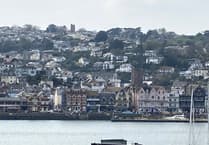The problem goes way deeper than the beauty of the bricks we build with
It was interesting to read Anthony Mangnall MP’s take on local housing issues in last week’s paper. He appears to believe the ‘biggest irritation of new developments’ is their lack of style.
While I’m sure style is important to many, I’d argue that the most ‘annoying’ thing about housing in South Devon is that it is simply unaffordable for local people, for our children, to stay in their communities; or that 10% of these aesthetic blights are empty for at least half the year because they were bought by someone who fancies having a holiday home.
You may feel a new development will negatively impact the appreciating asset you are sitting on if you own your home without a mortgage. But that development probably looks quite different if you are desperate to find a home and don’t want to have to move 50 miles away.
While talking about housing, I notice that our MP fails mention zero carbon homes – and claims that ‘every household comes with two cars’…
We have known for decades that a climate crisis was looming and yet we see estate after estate popping up around Dartmouth, Totnes, Paignton without a single solar panel on a roof. There is no legislation to require it and in fact Mr Mangnall’s own party dropped its zero carbon homes policy in 2015 under pressure from housebuilder Persimmon (Persimmon admitted to this).
It’s a scandal. Not only would we massively reduce carbon emissions by including renewable energy at the build stage of new homes, but we would also significantly reduce energy bills for residents.
Surely we should be building developments that negate the need for two – or even one – cars, yet years of underfunding local councils has made it nearly impossible for them to provide decent public transport systems.
Mr Mangnall says it is in the power of local authorities as to who wins what contracts and what areas are granted planning permission, yet I can immediately think of two large developments in his constituency that were rejected by local communities, denied permission by local authorities and then overruled by the Conservative Secretary of State – neither of them on a brownfield site.
So frankly, I think the aesthetics of new-build housing is the least of our worries. The housing affordability ratio in the South Hams is over 13 – that means that the average price of a house is almost 13 times the local salary. And almost one in ten homes in the South Hams is not a primary residence: the vast majority are owned as second homes and we have one of the highest rates of empty homes in the country.
But it gets worse! That figure does not include homes that have moved out of the long term local rental market and into the short term, holiday let market. A quick search shows there are over 1,000 small flats in Brixham available on AirBnB for a random week this July, and just four flats currently available for residential rent on RightMove. That’s 250 holiday rentals for every residential rental.
The truth is there is no housing crisis in south Devon. There are enough houses for everyone who needs one. We don’t need to build any more of the ugly houses Mr Mangnall seems to believe we despise so much - we have enough houses to go round, but they have been removed from our grasp as we have been outpriced.
He says we need to ‘push our local authorities to work with local communities’, yet unless we have legislative change at national level no local authority can sort this mess out, be it in the Lake District, Cornwall, Suffolk or South Devon. And this government has shown no willingness to tackle the issue seriously.
Doubling council tax on second homes is a start, and the extra funds will help the council support affordable rent, but it is unlikely to change much on the ground; if you are rich enough to buy a second home around here, you can probably afford a bit of extra tax.
We need national government to change the incentive structure in the tax system that makes short term holiday lets, rather than long term residential lettings more attractive for landlords. We need better legal protections for residential landlords and more safeguards for tenants (which do seem to be coming in new legislation).
But limits on the number of second homes in a community needs to be considered, so that more places don’t become hollowed out. Liberal Democrat MP Tim Farron, whose constituency in Cumbria faces many similar challenges to ours, is campaigning for a change in planning use for second homes and holiday lets to enable councils to control their number.
Mr Mangnall suggests that local authorities have the power to manage planning permission so that it opens the gate for more community land trusts and more socially affordable rental housing. I wonder how hard he pushed this when the Conservatives were running South Hams District Council, as they utterly failed to deliver on either for the last quarter of a century.
The Liberal Democrats now have the chance to try and change things in the South Hams, and the Conservatives in Torbay. We don’t believe any party has the monopoly on good ideas, regardless of who wins at the ballot box, but rather that good governance is achieved by people working together, openly and honestly, for the benefit of local communities. So if Mr Mangnall really does want to make a difference to the acute local housing crisis then I hope he will work with both local authorities in his constituency to develop a strategy that works across different levels of government, and be realistic in Westminster about the deep-seated structural changes that are needed if our local rural communities are to survive. They may not be popular with those who own holiday homes in his constituency, but the problem goes way deeper than the beauty of the bricks we build with.
Caroline Voaden, Liberal Democrat Parliamentary Candidate for Totnes
Tory policy needs to be reversed
In Anthony Mangall’s article last week about our housing problems he seems unaware that they are largely the result of decisions taken by his own party, who have been in power for 13 years.
Reversing Conservative policies which have deliberately hindered the provision of affordable housing would be a significant step.
These included preventing Local Authorities from building council housing, reducing grant funding to Housing Associations for affordable housing, and loosening planning requirements which forced developers to provide a decent proportion of affordable homes on all new sites.
Recent reports show that housing developers and builders donated approximately £60 million to the Tories in the last ten years.
Richard Luttman
Loddiswell




